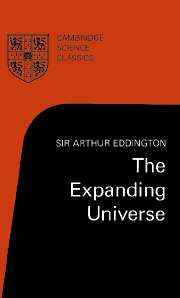CHAPTER I - The Recession of the Galaxies
Published online by Cambridge University Press: 15 December 2009
Summary
Pricked out with less and greater lights, between the poles of the universe, the Milky Way so gleameth white as to set very sages questioning.
Dante, ParadisoThe first hint of an “expanding universe” is contained in a paper published in November 1917 by Prof. W. de Sitter. Einstein's general theory of relativity had been published two years before, but it had not yet attained notoriety; it was not until the eclipse expeditions of 1919 obtained confirmation of its prediction of the bending of light that public interest was aroused. Meanwhile many investigators had been examining the various consequences of the new theory. Prominent among them was de Sitter who was interested especially in the astronomical consequences. In the course of a highly technical discussion he found that the relativity theory led to an expectation that the most remote celestial objects would be moving away from us, or at least that they would deceive the observer into thinking that they were moving away.
De Sitter was perhaps a tipster rather than a prophet. He would not promise anything definitely; but he suggested that we ought to keep a look out for the recession as a rather likely phenomenon. Theory was at the cross-roads, and desired guidance from observation as to which of two possible courses should be pursued.
- Type
- Chapter
- Information
- The Expanding UniverseAstronomy's 'Great Debate', 1900–1931, pp. 1 - 28Publisher: Cambridge University PressPrint publication year: 1920



